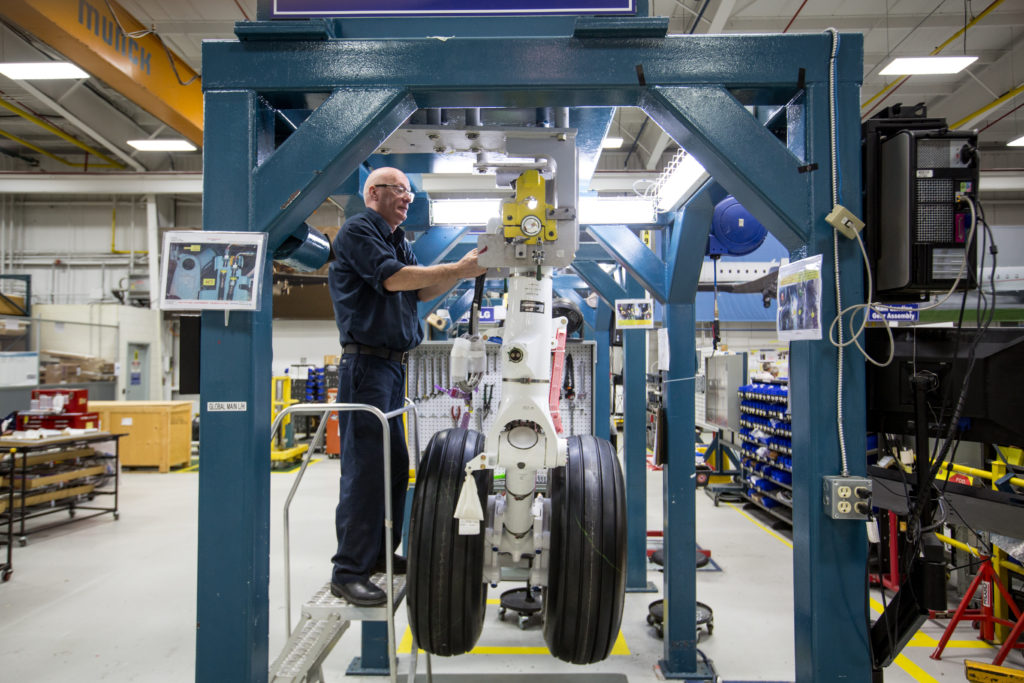Estimated reading time 4 minutes, 54 seconds.
If Quebec aerospace companies are to remain competitive, some of them will have to consolidate. It’s a recurrent theme that was prominent once again during International Aerospace Week in Montreal, Que., held April 15 to 18.

“Can all the SMEs [small- and medium-sized enterprises] survive this globalization?” asked Pierre Fitzgibbon, Quebec’s Minister of Economy and Innovation, during a discussion with aerospace media about efforts to support the province’s large cluster of small companies trying to integrate digital technologies and advanced manufacturing as part of a transformation to Industry 4.0.
The government will extend financial and other support, he said, but some companies may need to combine forces “so they can justify going to 4.0.”
That call to combine arms was echoed by Suzanne Benoît, president of Aéro Montréal, a strategic think tank that represents over 200 companies, most of the them SMEs, in the aerospace cluster. Under its MACH and MACH FAB 4.0 programs, the association has since 2012 been helping small companies strengthen their strategic planning and digitize their manufacturing processes.
Last May, Aéro Montréal launched Accelerator 360, an $8 million initiative to help SMEs gain a better foothold in global supply chains and expand their customer base. Noting the fierce competition SMEs face to win contracts on international aircraft programs, Benoit said most will need critical mass.
“We have been telling SMES [for some time] that they are too small,” she said. Accelerator 360 is designed to force companies to collaborate by teaming a few based on their strength and compatibility to then pursue targeted markets. The association will help identify candidates and support the development of export strategies, and hopes to see more mergers and acquisitions and joint ventures.
“When companies go global, they see the advantage of size,” she noted.
The drive to strengthen Quebec’s smaller companies is in part because the federal government is projected to increase defence spending by almost $14 billion, from $18.9 to $32.7 billion, over the next decade to recapitalize many of the Canadian Armed Forces fleets of aircraft, ships, vehicles, satellites, and communications systems.
Navdeep Bains, Minister of Innovation, Science and Economic Development, told a supply chain summit during the event that the government would leverage its Industrial and Technological Benefits policy and 16 key industrial capabilities (KICs) developed in consultation with industry–everything from advanced materials and autonomous systems to aerospace components and training and simulation technologies–to get the best return from defence procurement. Companies, he said, will “have to step up in a big way” when they bid on those programs.
With a large aerospace ecosystem, a federal government-back supercluster around artificial intelligence, and substantive research and development initiatives, the province is well positioned to capitalize. But at present Quebec firms receive only around 20 per cent of defence contracts, and most of that is in the form of offsets, said Fitzgibbon, a former executive with landing gear manufacturer Héroux-Devtek.
“We need to think cluster as well, because that is how it is going,” he said, suggesting Ottawa consider expanding its “innovation agenda” to include a broader defence strategy. “[We] realize there are contracts that they are going to give for defence in the next year or two [that are] are important, so there might be a requirement for a national strategy,” which would give provincial governments something “to anchor ourselves to. Failing which, I will be working on my own to make sure we get our fair share.”
“There is no question that for the Quebec government, defence is important,” he added. “I have no influence over what the federal government will do, but I will keep hitting the nail with whatever hammer I have.”
To generate strong players in defence, and aerospace more broadly, Fitzgibbon said would enlarge the mandate of Investment Quebec, the government’s investment arm that seeks to bolster Quebec businesses and attract foreign investment in the province, and expand the MACH FAB 4.0 initiative.
“The solidity of our supply chain partners is important,” he said. “Some of them have not invested enough in 4.0, innovative manufacturing, or for that matter digitalization of their businesses. I am going to be very aggressive to support these companies that are in need of capital.”








